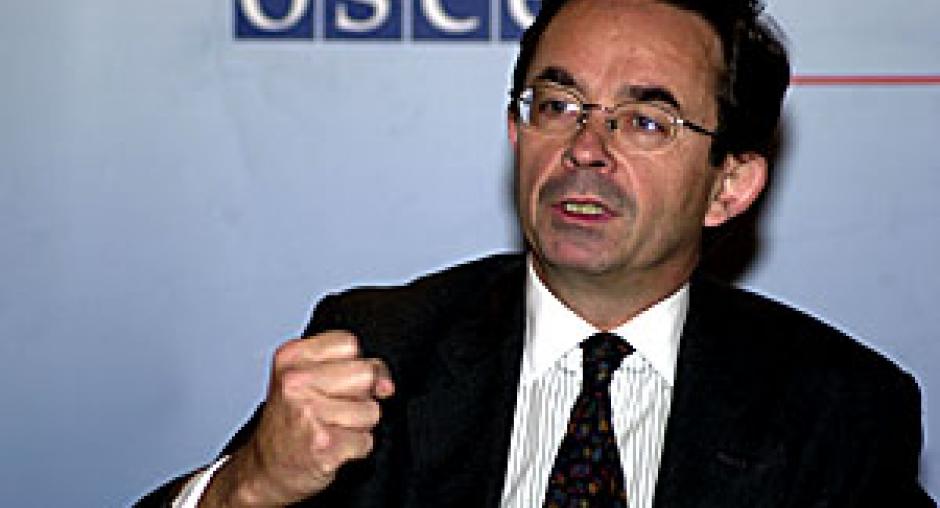Newsroom
OSCE/ODIHR calls for more civic awareness and less cynicism towards democratic institutions
WARSAW 17 May 2004

Ambassador Christian Strohal, Director of the OSCE's Office for Democratic Institutions and Human Rights. (OSCE/Alex Nitzsche) Photo details
WARSAW, 17 May 2004 - The first OSCE conference on democratic institutions and governance concluded with a call for more civic awareness and civic education to counter the growing cynicism among the public towards democratic institutions.
The three-day conference, which ended last Friday, was attended by over 200 political experts, diplomats and civil society representatives, who discussed challenges to the democratic process in both developing and established democracies.
"It is essential that we increase public understanding of the nuts and bolts of the democratic process if we are to turn around this wave of cynicism and lack of respect that we see in so many countries," said Ambassador Christian Strohal, Director of the OSCE Office for Democratic Institutions and Human Rights, which organized the event.
Conference participants examined the way in which democratic institutions function, paying particular attention to topics such as ways to strengthen law-making, the role of public administration, links between governments and citizens, and participation of non-governmental organizations.
Professor Juerg Steiner, the Swiss chair of the European University Institute, stressed the need for a new approach in education in order to change the attitude towards politicians and others in power. "There is a strong tendency to assume that all politicians are in politics for their own benefit. This cynical approach has diminished interest in politics, and understandably fewer and fewer people want to become politicians."
"We must encourage people to try to understand why politicians act the way they do," Professor Steiner said. "Their intentions may not always be selfish, but actually intended for the common good."
Ambassador Strohal added: "One cannot expect democracy to work if political parties themselves do not function democratically. Even though the lead role played by parties may have diminished, they still have to fulfil a key function that no other mechanism can replace."
The three-day conference, which ended last Friday, was attended by over 200 political experts, diplomats and civil society representatives, who discussed challenges to the democratic process in both developing and established democracies.
"It is essential that we increase public understanding of the nuts and bolts of the democratic process if we are to turn around this wave of cynicism and lack of respect that we see in so many countries," said Ambassador Christian Strohal, Director of the OSCE Office for Democratic Institutions and Human Rights, which organized the event.
Conference participants examined the way in which democratic institutions function, paying particular attention to topics such as ways to strengthen law-making, the role of public administration, links between governments and citizens, and participation of non-governmental organizations.
Professor Juerg Steiner, the Swiss chair of the European University Institute, stressed the need for a new approach in education in order to change the attitude towards politicians and others in power. "There is a strong tendency to assume that all politicians are in politics for their own benefit. This cynical approach has diminished interest in politics, and understandably fewer and fewer people want to become politicians."
"We must encourage people to try to understand why politicians act the way they do," Professor Steiner said. "Their intentions may not always be selfish, but actually intended for the common good."
Ambassador Strohal added: "One cannot expect democracy to work if political parties themselves do not function democratically. Even though the lead role played by parties may have diminished, they still have to fulfil a key function that no other mechanism can replace."
